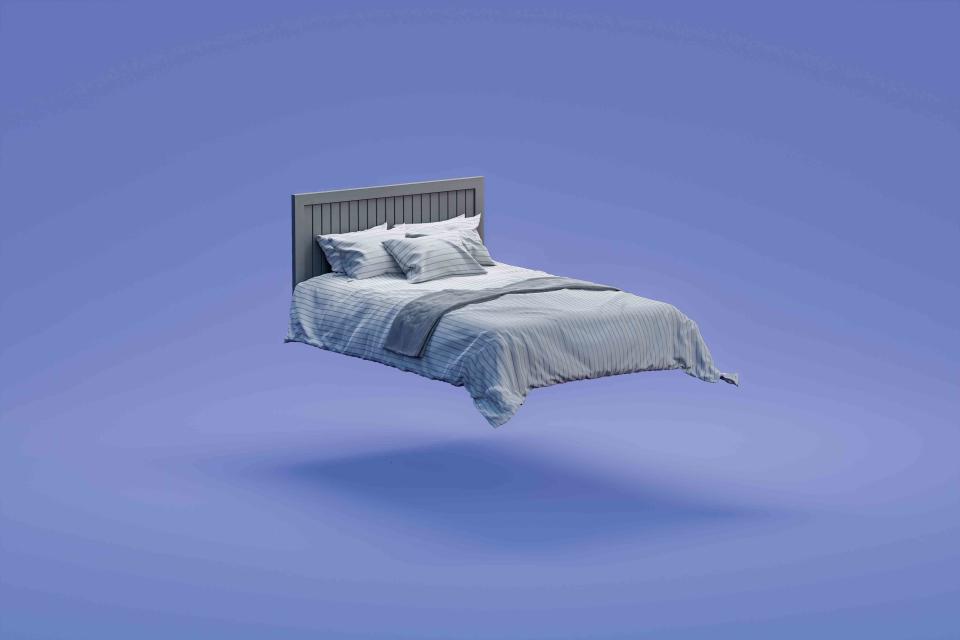TikTok’s Paradoxical Intention Sleep Hack Actually Can Help You Get Better Rest, Experts Explain
Who would've thought one way to get back to sleep is to actually try and stay awake?

Wayne E Wilson/Getty Images
If you have trouble sleeping—whether it’s falling asleep, staying asleep, sleeping too much, or too little—there’s a good chance you’ve tried everything you can think of to get better rest. While staying off devices before bed or taking a warm bath can help, you might be surprised to hear one of the best ways to fall asleep is to actually try to stay awake. It's called the "paradoxical intention" sleep hack, and experts say it actually does work.
Stress plays a big role in good sleep hygiene which is where the paradoxical intention sleep hack comes in. When we are wide awake and can’t sleep, this often stresses us out, which can only make falling asleep that much harder. Paradoxical intention helps you rid the anxiety of thinking about not sleeping simply by keeping yourself awake until your brain is ready for sleep.
While this sleep hack is currently circulating on TikTok, it's actually not a new concept in psychology. We spoke with some experts to learn more about how it can help you get a better night's rest.
Related: 5 Scandinavian-Inspired Sleep Hacks You Should Try to Finally Feel Well-Rested
Meet the Experts
Dr. Fariha Abbasi-Feinberg, M.D., is a sleep specialist and American Academy of Sleep Medicine (AASM) spokesperson.
Kathrin Hamm, Ph.D., is the CEO and Founder of sleep wellness company Bearaby.
What Is the Paradoxical Intention Sleep Hack?
Most of the time when we can’t fall asleep, we do just about anything to make it happen. This can cause us to coax ourselves into falling asleep, only to put more pressure on ourselves and heighten anxiety. This hack helps take that pressure away by sort of giving into it.
"The paradoxical intention sleep hack is a behavioral technique that involves individuals intentionally trying to stay awake, rather than fall asleep," says Dr. Fariha Abbasi-Feinberg, M.D., sleep specialist and American Academy of Sleep Medicine (AASM) spokesperson. "This is a strategy used by people who struggle with falling or staying asleep due to insomnia and 'sleep anxiety'."
You can think of this hack as almost a form of reverse psychology to use on your brain, so it does the opposite of what you’re telling it to do and gets you the results you want. “Rather than making a concerted effort to fall asleep when you might not be ready, this trend recommends staying awake in your bed until you relax and drift off on your own,” Abbasi-Feinberg says.
Who Should Try This?
Anyone who has trouble falling asleep knows the stress it can bring, and the irritability and exhaustion that come with it the following day. Abbasi-Feinberg states that a recent survey conducted by AASM showed that 40% of Americans admit to having tried a sleep trend to help with their sleeping issues.
“People want to sleep well," Abbasi-Feinberg says, "which is why we are seeing more and more folks drawn to viral sleep trends or hacks."
Kathrin Hamm, Ph.D. and CEO and Founder of sleep wellness company Bearaby explains those who try to fall asleep and can’t often feel helpless because there doesn’t seem to be any remedy or cure in sight. This hack can help alleviate that feeling by taking back control of your sleep.
“For many, trying something like the paradoxical sleep hack can provide a greater sense of control and ultimately alleviate some of the anxiety that inevitably arises because they can’t fall asleep,” Hamm says.
More Tips for Better Sleep
The paradoxical intention sleep hack can be a helpful tactic to get sleep but it’s not the only thing you can do to help achieve a good night’s rest time and time again. Hamm says a regular daytime nap can also be a good option. “Let go of the guilt around resting during the day and allow your nervous system time to reset when needed.”
Abbasi-Feinberg states consistency is key to getting better sleep. This means it's important to get sleep at the same time every day, even on weekends or during vacations, while also exercising regularly and maintaining a healthy diet, she explains.
Sleep tools can also come in handy for additional comfort while you are getting ready to fall asleep. Hamm recommends a sleep mask to shut out any light or weighted blanket to promote a sense of calm (similar to a hug) that can be built into your bedtime routine.
“Try to manage your stress levels—implementing soothing sensory tools and calming strategies as a regular part of your day can positively affect the quality of your nighttime rest,” Hamm says.
Abbasi-Feinberg also stresses when natural sleep tools or hacks don't seem to do the trick, it may be time to seek professional medical help. "If you struggle with sleep, meaning you can’t get the recommended seven or more hours of sleep per night, you should discuss treatment options with your physician."
Related: 6 Nightly Techniques to Help You Get to Sleep Fast, According to Sleep Experts
For more Real Simple news, make sure to sign up for our newsletter!
Read the original article on Real Simple.

 Yahoo Lifestyle
Yahoo Lifestyle 
